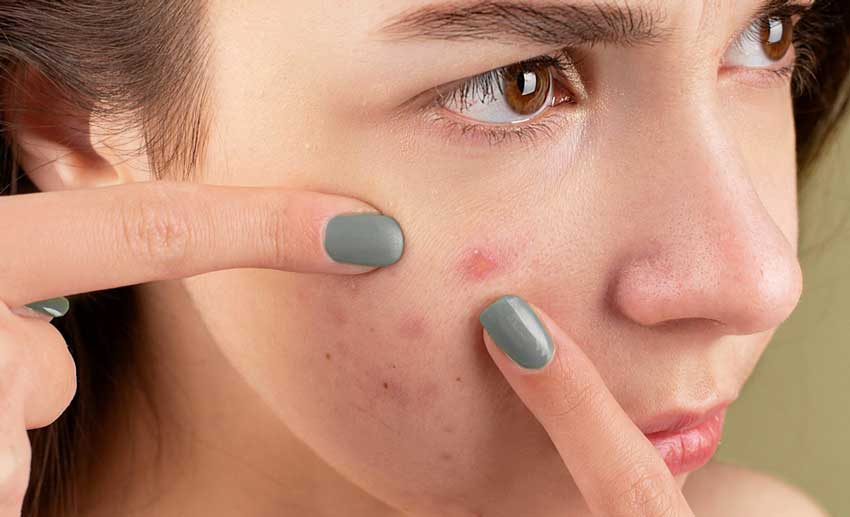Acne treatment - isotretinoin - Explained by Dr. Yeung Ho Hong(楊浩康)
"Isotretinoin" is a very effective treatment for severe or persistent acne. People who can complete the entire course of treatment often see lasting improvement in acne. The effects of Isotretinoin needles include: 1. Inhibit hair follicle keratosis and reduce the formation of acne or blackheads. 2. Inhibit the activity of sebaceous glands. 3. Inhibit the propagation of Propionebacterium acnes. 4. Inhibit the inflammation of hair follicles.
Photo by Anna Nekrashevich from Pexels: https://www.pexels.com/photo/woman-squeezing-her-pimples-with-her-fingers-6476081/

Isotretinoin has a significant effect on severe acne that is ineffective in traditional treatments, such as acne cystica or nodular acne. Patients with acne need to take a complete course of treatment to have a good effect. However, oral administration of Isotretinoin may cause many different side effects. It is also recommended to take a blood test before taking it. If a person with acne wants to start oral Isotretinoin, he needs to consult a doctor for evaluation and start the course of treatment under supervision. In the current study, it is known that oral Isotretinoin can effectively reduce the risk of recurrence of acne if sufficient treatment dose and treatment time are accumulated. The American Academy of Dermatology (AAD) consensus on the treatment of acne in 2016: It is generally recommended that the cumulative total dose should reach 120 mg/kg to 150 mg/kg. However, even if the recommended cumulative total dose is reached, approximately one-third of acne patients will relapse and need to be treated again.
Although oral Isotretinoin has a good effect on acne, it may cause a variety of side effects. However, not everyone who takes Isotretinoin will have these side effects and sequelae. Patients who are pregnant (pregnant women or women who may become pregnant during treatment), liver insufficiency or abnormality, hypervitamin A, and hyperlipidemia should avoid oral Isotretinoin. A small number of acne patients may experience the so-called "explosive acne period" in the early stage of using oral Isotretinoin, and the acne will get worse. After continuous treatment, this condition will gradually disappear, and usually there is no need to adjust the drug dose.
Side effects that may be caused by oral Isotretinoin:
- Symptoms related to dryness, such as dry mouth or nasal mucosa, cheilitis, dry dermatitis, peeling, dry eyes. If you have dry eyes, artificial tears can be used to relieve symptoms. If vision problems occur, oral Isotretinoin should be discontinued and an ophthalmologist checked.
- If used by pregnant women, it will cause fetal malformations. Therefore, before starting to take oral Isotretinoin, it is necessary to ensure that there is no pregnancy, and contraception is required for one month before and during the course of treatment. If you are breastfeeding after childbirth, it is not advisable to take Isotretinoin
- Long-term use of oral Isotretinoin may affect liver function and blood fat, so regular blood tests are required to check liver function and blood fat. In general, liver function should be checked before treatment and 1 month after starting the medication, and then every 3 months. In the course of treatment, if the liver index exceeds the normal value, it may be necessary to stop oral Isotretinoin or reduce the dosage. During treatment, blood lipids, especially triglyceride (triglyceride) levels should also be monitored. If triglycerides are found to be too high during the course of treatment, or symptoms of pancreatitis appear, oral Isotretinoin should be stopped immediately.
- A very small number of patients develop benign intracranial hypertension (pseudo-tumor cerebri) after taking oral Isotretinoin. In these cases, some have used oral tetracyclines (tetracyclines), so during the course of oral Isotretinoin treatment, you should stop taking tetracyclines, such as tetracycline, minocycline, doxycycline, etc.
- Other possible side effects include: joint pain, muscle pain, headache, temporary hair loss, visual disturbance, mood swings, etc.
After many acne patients have heard about the effects of Isotretinoin on acne, they will ask their doctors to start oral Isotretinoin treatment. However, before treatment, learn more about oral Isotretinoin, consult your doctor more, and discuss the best treatment plan with your doctor to prescribe the right medicine.
